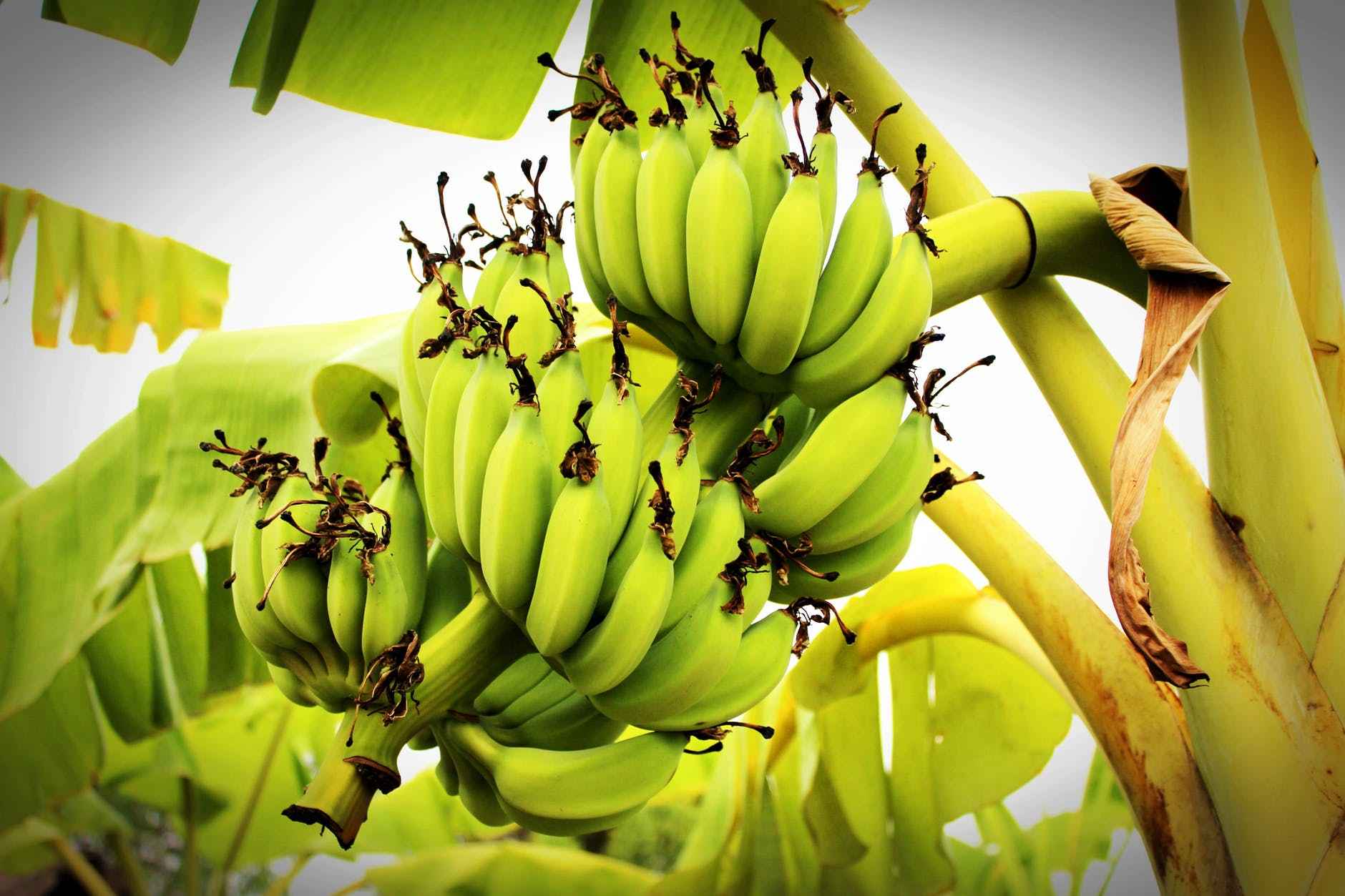 Whether you’re freaking out because your dog ate some plantains he ”found” in the house; or wondering if giving your dog this sweet treats is safe at all, don’t worry because we’ve got you covered.
Whether you’re freaking out because your dog ate some plantains he ”found” in the house; or wondering if giving your dog this sweet treats is safe at all, don’t worry because we’ve got you covered.
Can Dogs Eat Plantains, are They Safe for your Dog?
Dogs can eat plantains, they are neither toxic nor harmful to dogs. In fact, serving them in small portions can help improve their health and treat some common diseases. Just make sure you don’t confuse Plantains with Plantain Lily, which can be fatal for our furry friends!
Like many other fruits and vegetables, plantains can contribute to our dog’s health, but we should always know the correct amounts, benefits and preparations. Read on to learn more.
Plantains For Dogs & Can Dogs eat them?
Its biological name is Musa Paradisiaca and they are those greener and bigger cousins from the banana family, and can be found all around Central and South America. Although bananas and plantains may look similar, plantains are a more starchy food and should be treated like one, so it is better to never eat them raw!
Raw plantains have a similar texture and bitterness as raw potatoes, but besides that, there is no genuine danger if your doggie had a few bites of it. However, the starches in raw plantains can make it difficult to digest and upset our dog’s tummy. Just keep an eye on them.
Once cooked, giving our dogs small doses of plantains can provide several nutritional benefits. For centuries, plantains have been used to treat insect bites, digestive and urinary problems, help soothe coughs, and skin disorders.
The Harvard School of Public Health reports proved that plantains are high in potassium, magnesium, calcium, fiber, and vitamins B6, B7, A, K, and C. Plantains are also packed with antibacterial and anti-inflammatory properties.
Here are more facts about how these nutrients can contribute to your dog’s health:
- Vitamin B7 or Biotin aids in our pup’s proper muscle formation, boosts energy, maintains a healthy digestion by metabolizing fatty acids and proteins and will give our dogs a shiny and beautiful coat.
- Vitamin B6 is necessary for protein synthesis, production of red blood cells and healthy brain functioning. It can help fight anemia and hormone regulation.
- Vitamin C is a natural antioxidant and stimulates collagen production; which keeps our dog’s fur and bones healthy. Also, it improves our dog’s immune system, acts as an antihistamine in case of allergies and helps produce natural antibodies.
- Magnesium is very important in our doggy’s muscle function and regeneration; it helps the correct absorption of minerals and plays a very important role in balancing our dog’s mental health.
- They contain resistant starch, which helps digestion and promotes the growth of healthy gut microbes.
- Potassium replaces lost electrolytes, boosts metabolism and brain function; promotes correct organ function, muscle growth, and balances PH levels. Potassium also works along with calcium to help our doggies have healthier and stronger teeth and bones.
The pulp is where you can find most of these benefits, but all parts of the plantain plant have medical aids. Flowers can help with bronchitis and ulcers; the stem juice is diuretic; tender leaves help on burns and skin rashes; and the peels and roots are helpful with digestive and skin problems.
If you are worried about your pet’s diet, take into consideration The Precision Nutrition Encyclopedia of Food information; which states that one cup of raw plantain provides 181 calories, 1.9g protein, 0.6g of fat, 47.2 g of carbohydrates, 3.4g fibers, and 22.2g sugars.

How do I give plantains to my Dog
Like with any other food, avoid using plantains regularly and try to choose more mature and fresh plantains to get the most benefits.
When using plantains with pets, just remember that the key difference between bananas and plantains is that plantains always need to be cooked, boiled or steamed. After cooking them, you can prepare a delicious puree of mashed plantains or make some juice by running the whole plant through your juicer with water.
The ideal moderation amount is a teaspoon of juice for every twenty pounds of body weight with his meals, and only a few pieces when mashed.
Plantains peels are great for treating bug bites or plant stings, if you want to try it out it is recommended to apply directly into the wound for a few minutes.
Can Plantains be bad for your dog
No, but I get why you might think so! I recently learned that plantains got some poor reputation because there is a slight confusion between them and the Plantain Lily. This common and beautiful flower has saponins, a glycoside that can cause great harm to our dogs’ health provoking skin rashes, depression, stomach irritation and might even be fatal.
Don’t worry; even then, it would not be mortal right away. Mild intoxication of this plant can still be treated when ingested.
However, plantains are part of the Musaceae family, while Plantain Lily belongs to the Liliaceae family; which makes them completely unrelated one to another.
What about Fried Plantains
As tempting as it may sound, the recommendation is to stay away from some fatty foods since they can lead to intoxication or severe gastrointestinal illnesses, especially for small breed dogs.
However, it’s important to mention that fried foods are not part of the top dangerous foods for pets according to the Animal Poison Control Center; which include alcohol, avocado, chocolate, coffee, caffeine, citrus, coconut and coconut oil, grapes, raisins, macadamia nuts, undercooked meat, raw eggs, xylitol, garlic, onions and chives.
Remember that our dog’s body processes food differently than we do and not all human foods are fit for their digestive systems.
“Our bodies may break down foods or other chemicals that dogs can’t tolerate” – Carmela Stamper, D.V.M., a veterinarian at the U.S. Food and Drug Administration (FDA),
Plantain Chips
As delicious and energy-boosting snack plantains chips might sound, they are not the best option for our pups. They can be high in calories and sugars but can be an occasional treat, just keep in mind these considerations:
- Avoid commercial chips at all costs. They contain high levels of sugar, fatty acids, and even harmful ingredients for our babies.
- Stay away from frying the chips or adding sugars. Fatty Acids and too much sugar can lead to chronicle diseases.
- Homemade dehydrated chips are the best option to maintain plantain benefits. Just keep the portions to a minimum.
Can Dogs Eat Sweet Plantains
Yes. Plantains can be consumed ripe and unripe.
When plantains are unripe, they will have a greener and harder peel, they can be bitter to the taste if eaten raw and take longer to cook. When plantains ripen, they turn yellowish with black dots, and acquire a sweeter taste when cooked, but less than a normal banana.
Can Dogs Eat Plantain Leaves?
If your dog ate some, you have nothing to worry about. Plantain plants and peels are neither toxic nor dangerous either, however, the peel is filled with fiber and it might lead to indigestion, and even vomiting, so monitor your doggie.
Related Questions
What to do if my dog is allergic to plantains? Although this allergy is not common, breathe and call your vet right away. Itchy skin and vomiting might be signs of allergy.
How many plantains can I give my dog? The right amount depends on the size and weight of your dog. While bigger dogs can have up to half a plantain, smaller doggies should not exceed beyond a couple of pieces.
Can I make plantain ice-cream treats for my dog? Sure! Frozen treats can help our pet cool down under hot temperatures; however, try to keep it homemade, with no added sugars, and avoid including any dairy.
Are they related to the broadleaf plantain? Even though they also share the same name, they are from complete different families. Broadleaf plantai belongs to the Plantaginaceae family and has heart-shaped leaves. It is known for its multiple healing properties for humans and animals.






